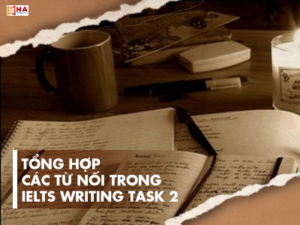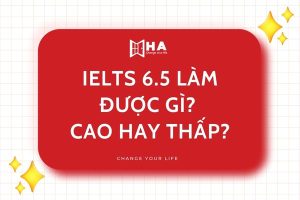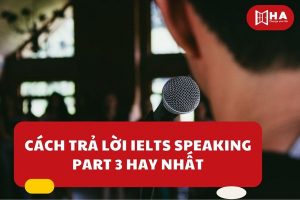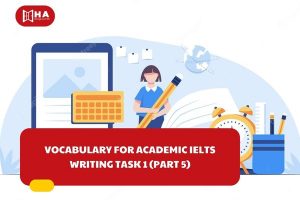Phần thi IELTS Speaking là phần thi mà nhiều sĩ tử ngại nhất và lo nhất vì phải đối mặt với giám khảo chấm thi. Yếu tố tâm lí có ảnh hưởng rất lớn đến bài thi nói của sĩ tử. Chính vì vậy mà không phải sĩ tử nào cũng đạt được điểm cao dù nói rất tốt trong quá trình luyện thi. Trong bài viết lần này, HA CENTRE sẽ chỉ ra các lỗi tối kỵ trong IELTS Speaking để các bạn tránh nhé!

Những điều tối kỵ trong bài thi IELTS Speaking
1. Học “tủ” câu trả lời Speaking mẫu
Giám khảo IELTS là những người đã được đào tạo để phát hiện lúc nào thí sinh nào đang “tua lại” một câu trả lời học thuộc trước ở nhà. Trong trường hợp này, họ sẽ không để ý tới câu trả lời mà bạn đã dày công nghĩ ra đâu. Vì nó không phản ánh đúng năng lực tiếng Anh thật của bạn. Như vậy, bao công học “tủ” và tạo dựng nên một câu trả lời bạn cho là hoàn thảo sẽ đổ xuống sông xuống bể. Bạn có thể tham khảo bộ đề Speaking dự đoán, lên ý tưởng, nghiên cứu thêm trên mạng, nhưng đừng học tủ cả câu trả lời hoàn chỉnh nhé. Một chút lúng túng khi gặp một câu hỏi khó, một chút nhăn nhó khi tìm từ vựng để diễn đạt – đôi khi lại tốt cho bài thi đấy.
2. Nhồi nhét từ vựng “khủng”
Tiếp theo trong số tips IELTS Speaking là đừng cố nhồi từ vựng. Nhiều thí sinh học một list từ “khủng” ở nhà. Và trong 14 phút khi thi, họ cố gắng nhét thật nhiều những từ đã học vào trong câu trả lời của mình. Việc này cực kì phản tác dụng, vì chắc chắn sẽ có những từ bị dùng sai ngữ cảnh. Từ vựng tốt (less common vocabulary & idiomatic expressions) nên được dùng (rải rác). Đừng cố ép bản thân phải nhồi nhét những từ vựng quá khó nhé.
3. Nhắc lại y nguyên đề bài trong Part 2
Đây là một thói quen khá phổ biến của thí sinh IELTS – Bắt đầu phần trả lời Part 2 bằng câu “Today I will tell you about [nhắc lại đề bài]”. Thay vào đó, bạn nên paraphrase một chút. Ví dụ: Đề: Describe a famous person that you admire.
Trả lời: So when it comes to my favorite celebrity, I would like to talk about Son Tung MTP, who is one of the most talented and popular singers in Vietnam.
4. Tán phét với giám khảo
Không ít giám khảo IELTS trông khá thân thiện. Nhưng không vì thế mà bạn nên thoải mái “hỏi chuyện” họ. Hãy tập trung vào phần thi của mình. Phần thi của bạn chỉ bắt đầu khi giám khảo nói “Let’s talk about [topic đầu tiên của Part 1]”. Trước đó, bạn đừng “tương tác” với giám khảo bằng cách hỏi chuyện người ta. Hoặc “dốc bầu tâm sự” khi người ta mới hỏi “Could you tell me your full name please?” Kết thúc bài thi, cũng đừng nán lại hỏi xem họ tối nay làm gì, ăn gì. Bạn vào phòng là để thi, giám khảo ngồi đó để chấm thi. Hãy giúp họ làm tốt công việc của họ và bạn hoàn thành tốt bài thi của mình.
5. Một số bài mẫu cho bạn luyện tập

Một số bài mẫu cho bạn luyện tập
IELTS Speaking Part 3: ‘reading’ topic
Câu hỏi 1: Are any occasions when reading at speed is a useful skill?
Personally, if I’m reading something interesting, I don’t like reading too quickly because I feel that I don’t properly absorb the information. However, it can be useful to skim through things when you don’t really want to read them, or when you just need to find one particular piece of information. For example, I read at speed when I’m checking a household bill or a letter from the bank.
Câu hỏi 2: Are there any jobs where people need to read a lot? What are they?
Well, researchers obviously need to read a lot, and I suppose that politicians, journalists, and other professionals who need to know about current affairs read a lot too. Having said that, I think most workers read hundreds of emails every week. In my previous job, for example, I had to check internal staff emails at least twice a day.
Câu hỏi 3: Do you think that reading novel is more interesting than reading factual books? Why is that?
Both types of books can be equally interesting in my opinion. A good novel can transport you to another world where the characters in the book become almost real. On the other hand, factual books can give you fascinating insights into anything from psychology to ancient history.
IELTS Speaking Part 3: ‘TV program’ answers
Câu hỏi 1: Do you think most people watch TV for education or for entertainment?
I think people watch TV primarily for entertainment. There are far more entertainment programs than educational ones, and in my experience, most people treat television as a form of relaxation in the evening. If I think about the most popular TV programs in the UK, such as talent shows like ‘X Factor’ or soap operas like ‘Eastenders’, the focus is definitely on entertainment rather than education.
Câu hỏi 2: Should TV play a role in educating children? How?
Yes, it definitely should play a role in my opinion. Good children’s TV programs should tell stories that contain some kind of lesson about how to behave or what is morally right and wrong. Many of the traditional fairy tales, such as ‘Cinderella’, have been made into TV programs, and there is always a positive message in those stories.
Câu hỏi 3: How do you think TV viewing habits change as people get older?
TV viewing habits obviously change a lot as we get older. While toddlers might watch programs about talking animals, teenagers prefer action and adventure or sports, and as adults, we start taking an interest in news and politics. My own preferences, for example, have changed over the years – I would never have watched news programs when I was younger. think it would be very strange if our viewing habits didn’t mature!
Rất mong bài viết này sẽ có ích với tất cả mọi người đang ôn luyện IELTS! Nếu bạn còn thắc mắc hoặc có nhu cầu học IELTS, hãy liên hệ ngay với HA Centre theo số điện thoại MR. HA: 0963 07 2486, HOTLINE 1: 032 796 3868, HOTLINE 2: 032 976 3868 để được giải đáp nhanh nhất nhé!

















